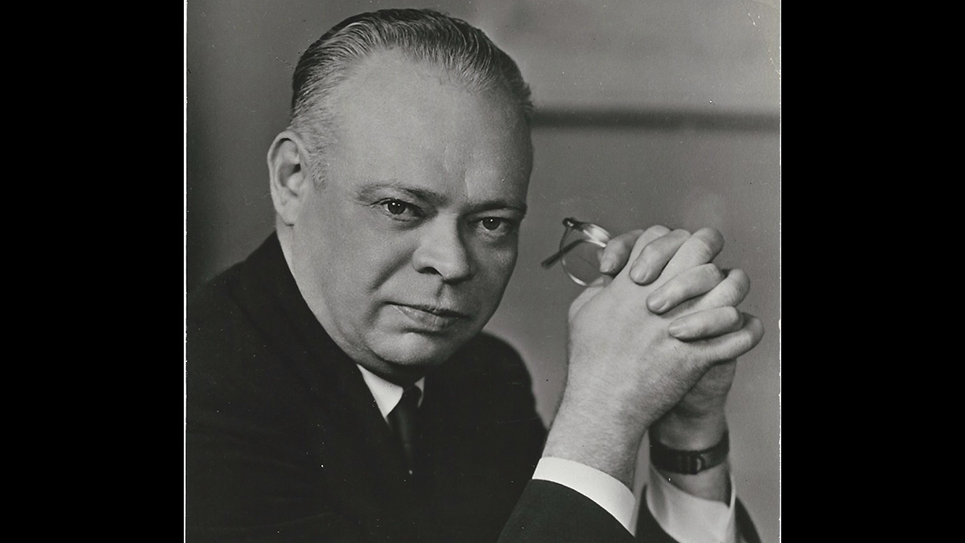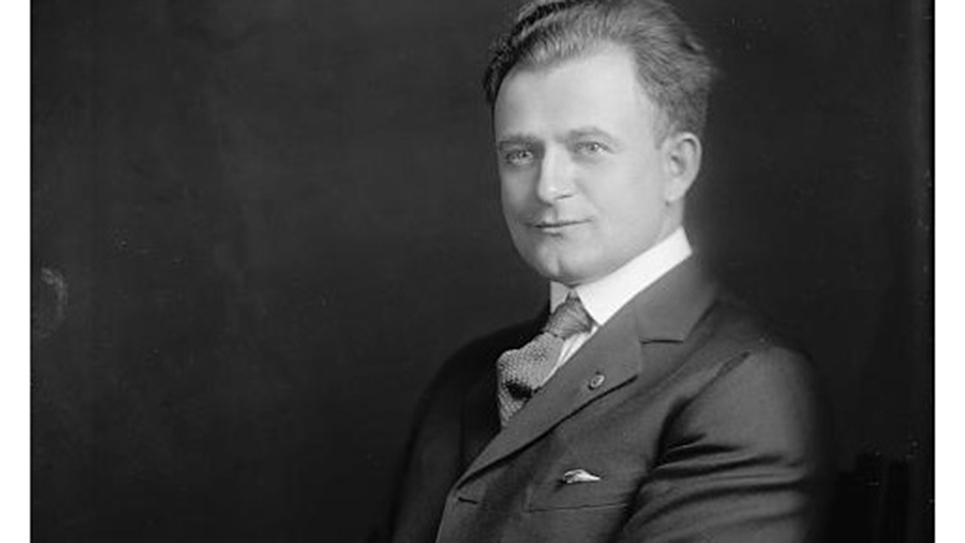The Fall of Congressman John Jennings, III
By Ray Hill
John Jennings had represented Tennessee’s Second Congressional District since 1940 and as 1950 dawned, the congressman faced the greatest threat to his continued tenure in office in a decade. Carroll Reece, who had spent 24 years in Congress representing Tennessee’s First Congressional District and had served as chairman of the Republican National Committee, was running to reclaim his seat in the House of Representatives. Reece had been Tennessee’s Republican National Committeeman since 1939 and was the best-known Republican politician south of the Mason-Dixon Line. Carroll Reece was a national figure, a rarity for the time. Reece was also the most influential Republican in the Volunteer State and commanded a mighty formidable political organization inside the First District. Reece was running against his successor, Dayton Phillips, who was pro-labor and cast himself as the friend of the working man. Phillips was allied with Congressman John Jennings, as both had helped to undercut the GOP statewide ticket in the 1948 election. Reece, ousted as chairman of the RNC, had come home to run for the United States Senate in a year just about everybody believed would be a great victory for the GOP. For the first time since 1916, Tennessee Republicans nominated a serious statewide ticket with real appeal to the people. Reece was the Republican nominee for the U.S. Senate while country music legend Roy Acuff was the GOP candidate for governor. While campaigning across Tennessee, the Reece-Acuff ticket drew crowds in the tens of thousands, causing Volunteer State Democrats to become increasingly jittery.
When the GOP ticket lost Tennessee’s reliably Republican Second District, Guy Lincoln Smith was livid. Smith was the powerful editor of the Knoxville Journal, a daily newspaper that was the voice of Republicanism in East Tennessee in particular, and Tennessee in general. Guy Smith was also at the same time, chairman of Tennessee’s Republican State Executive Committee. The Journal was as lively and vibrant as its daily competitor was staid and dreary and Democratic. Republican presidential nominee Thomas E. Dewey had carried the Second Congressional District, while Carroll Reece and Roy Acuff were running behind the rest of the GOP ticket. Even inside the First District, there were indications supporters of Dayton Phillips had voted for Dewey while supporting the Democratic nominees for the Senate and the governorship. Guy Smith looked to Congressmen John Jennings and Dayton Phillips as the men largely responsible for undercutting Reece and Acuff. Tough and determined, Smith was implacable in his quest to unseat both of Tennessee’s sitting GOP congressmen. Having been defeated for statewide office and no Republican administration to offer him a Cabinet seat or a high federal appointment, Carroll Reece was running to win back his seat in the House of Representatives. Such was Dayton Phillips’ campaigning skills and personal popularity that the powerful Reece organization had been unable to beat him inside the Republican primary either in 1946 or 1948. Phillips would be hard-pressed to beat Carroll Reece.
John Jennings had been the most influential supporter of Thomas E. Dewey in both of the New Yorker’s two failed presidential campaigns in 1944 and 1948. When Dewey, the overwhelming favorite to win the presidency, lost to Harry Truman, much of the Tennessean’s political prestige crashed along with the Dewey candidacy. There were also increasing signs of dissatisfaction with Jennings. The congressman had only beaten Hobart Atkins by 2,400 votes in the Republican primary in 1948 and only in one instance during his decade of service in the House did he win a huge majority in the general election. Bald, bespectacled, loud and bombastic, as well as an excellent platform speaker, John Jennings was impossible to ignore.
Atkins had been pondering whether to launch another campaign for the House against Jennings. Another prospective candidate was Howard Baker (not to be confused with his son who later was elected to the U.S. Senate), who had been the elected district attorney general for a collection of counties surrounding his own native Scott County. Baker maintained a law practice but spent much of his time tending to his holdings in coal, oil and natural gas, all of which had made him wealthy. Baker had supported Atkins when the state senator had opposed Congressman Jennings in 1948 and there was reason to think Atkins would return the favor should the Scott Countian become a candidate for the House.
At the end of January, Baker announced he would run for the House of Representatives. There was no love lost between the 48-year-old Baker and the 70-year-old Congressman Jennings. The enmity between Jennings and Baker had begun at the 1948 Republican National Convention in Philadelphia. Jennings, strongly backing Thomas E. Dewey, was enraged when Baker, chairman of Tennessee’s delegation, had voted for Senator Robert Taft of Ohio. Harsh words were flung at one another, and the rift was never healed and became worse still. That same year Baker openly supported Hobart Atkins against Judge Jennings, giving “fiery speeches” denouncing the congressman in several counties in the Second District.
Baker had ties to Knox County having lived in Knoxville before moving back to Scott County where he acquired his considerable mineral and land interests. Howard Baker was the vice president of the Russell Producing Company, which provided natural gas to more than 1,000 families in Scott and Morgan Counties. Baker was the chairman of the board of directors of Oneida’s First National Bank and held some part ownership in 1,000 acres of coal fields in and around Huntsville.
Howard Baker had come up through the ranks having been elected to the Tennessee House of Representatives, representing Scott and Union counties, as well as to the Scott County School Board. From 1934 until his voluntary retirement in 1948, Baker represented Scott, Anderson, Campbell, Morgan, Fentress and Claiborne counties as attorney general. Baker had run statewide campaigns as the GOP nominee for governor in 1938 and U.S. senator in 1940.
Baker was indeed a Scott Countian and lived in Huntsville until the age of twelve when he and his parents moved to Knoxville. Baker joined the Methodist Church at twelve and later became a Presbyterian when he moved back to Huntsville, explaining there was no Methodist Church in Huntsville.
In announcing his campaign, Baker did not shy away from criticizing the incumbent, saying “in my considered judgment the people want a change in their representation … So far as I can find, the only argument offered by his satellites for rehiring the present Congressman is that at the end of his present term he will have had the job for 11 long years – – – which is exactly what I object to.”
Baker’s campaign manager was his 24-year-old son, known as Howard Henry.
Even then, Democrats joyfully pointed to every “sign” Tennessee’s Second District was going Democratic, which was repeated by such columnists as Edward Smith of the Knoxville News-Sentinel and Joe Hatcher of the Nashville Tennessean.
Like Howard Baker, Jennings had held a judicial office, having been elected chancellor for a district that included Campbell, Anderson, Claiborne, Hancock, Hawkins, Loudon, Roane and Scott counties. Jennings was a native of Campbell County but had lived in Knoxville for the last 27 years while practicing law. Jennings was a member of the influential House Judiciary Committee.
Judge Jennings delayed his own announcement of candidacy until June 1, 1950, two months before the primary. It was a different period of time, long before the year-round, non-stop and seemingly eternal campaign cycles of today.
The congressman told the people of the Second District the question of representation in Congress came down to who could serve them best. Jennings pointed to his record in the House. “It is one of the promises kept by performance.” Jennings noted his record on the Tennessee Valley Authority, as he was an ardent supporter of the agency, which meant much to the Second District. The congressman said he had taken the lead in the House to authorize a $40 million appropriation to build the Fort Loudon Dam in Lenoir City. “I have supported each and every measure passed by the Congress for the benefit of veterans, their widows and dependents,” Jennings noted.
Jennings was widely known for his furious opposition to many local courthouse machines inside his congressional district. “In Jan.,1940, when I began my service as a member of Congress, the Biggs machine in Polk County, the Cantrell machine in McMinn County and the Brakebill machine in Monroe County, by force and fraud had abolished free elections and had stolen virtually all county offices in these three counties,” Jennings reminded voters. “For eight years. . .I have waged unceasing warfare to drive from power these bullies of the ballot box and to restore to these splendid people the right to vote and have their votes counted as cast.” Those same machines had been overthrown in the 1946 and 1948 elections.
The congressman had supported federal money for aid to education and school lunches, as well as funds for the University of Tennessee. Jennings did not ignore the continuous torrent of bad publicity from Guy Smith’s Knoxville Journal. Jennings thundered he had “disregarded the sniping, continuous, false, and malicious attacks that have . . . been made upon me in the Knoxville Journal by its editor.” Jennings said he would provide the people of the Second District with the “facts” regarding his feud with the newspaperman.
“Guy Smith is the first editor of a Knoxville daily paper who had prostituted his editorship to the advancement of his own private advantages and personal ends,” Jennings stated. The congressman insisted Smith had allied himself with the Crump machine in Memphis as well as the Reece organization. Jennings claimed Smith had made “impossible demands on me” after becoming state chairman of Tennessee’s Republican Party. The congressman accused Smith of having urged him to oppose the New Johnsonville steam plant after having published an editorial in favor of building the facility. Jennings cried Smith had removed every member of election boards inside the Second Congressional District who were friendly to him and replaced them with those who were supporting Howard Baker. The congressman also hurled the accusation Guy Smith had tried to offer Gordon Browning the Journal’s support for his administration in exchange for Smith having control of the Republican members of the State Election Commission.
The bitterness between John Jennings and Guy Smith was unbounded. The congressman snapped Smith was a “snake that walks like a man.” Smith moved the Journal fully behind Baker’s candidacy. Baker tallied up the salary earned by Judge Jennings’ daughter Helen, which was $620.29 per month. The challenger said Miss Jennings had earned $38,000 working for her father during his ten years in Congress and remained on the payroll. Baker promised if he was elected, there would be no nepotism. Let me say I knew Miss Jennings and she was a lovely woman.
Baker also was highly critical of the congressman’s attendance record, demanding to know where Jennings was when he was absent from Washington “one-third to 40 per cent of the time Congress has been in session.”
Baker and Jennings quibbled over the Taft-Hartley Act; Jennings claimed Baker didn’t support the labor legislation, while Baker said even Senator Taft admitted the bill passed by Congress was not perfect and could stand to be tweaked. “When I opened my campaign several days ago over the radio I stated that Mr. Jennings, if for no other reason, should be retired from Congress because of his absentee record . . .” Baker insisted.
The congressional race was so hard fought and bitter, that local Republicans feared the effect down ticket in campaigns for lesser offices. The growing bitterness in Republican ranks was music to the ears of Democrats who intended to take advantage of the intraparty strife. Democrats boasted there was no deep animosity between their two candidates competing for the nomination for the U.S. House of Representatives, Frank Wilson and William E. “Bill” Badgett.
© 2025 Ray Hill







